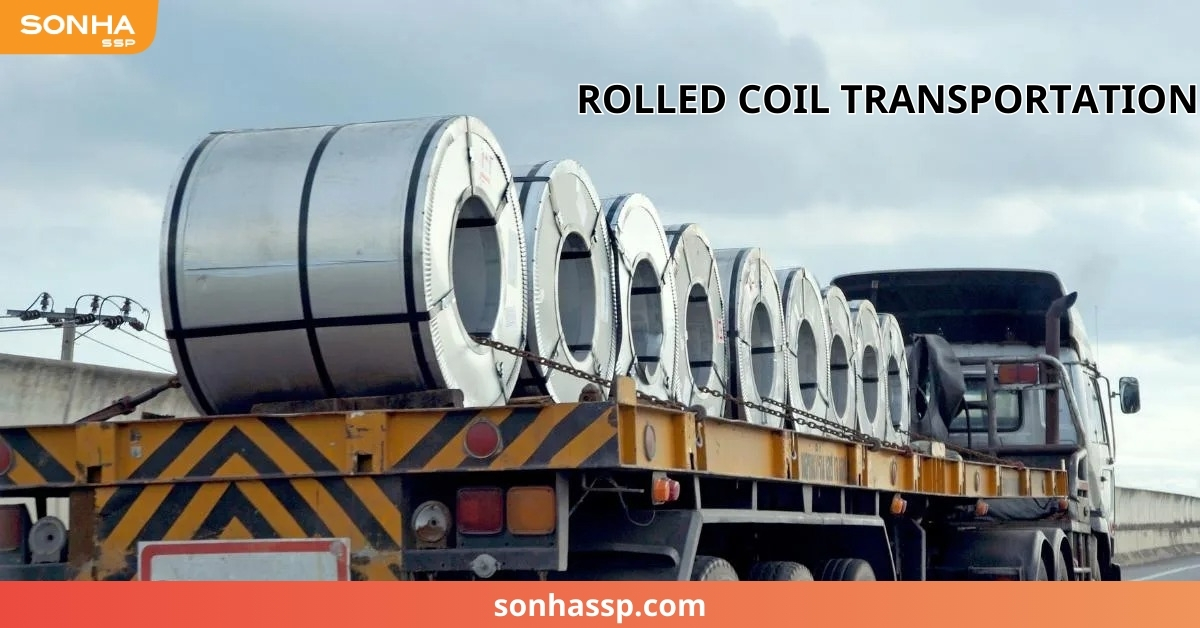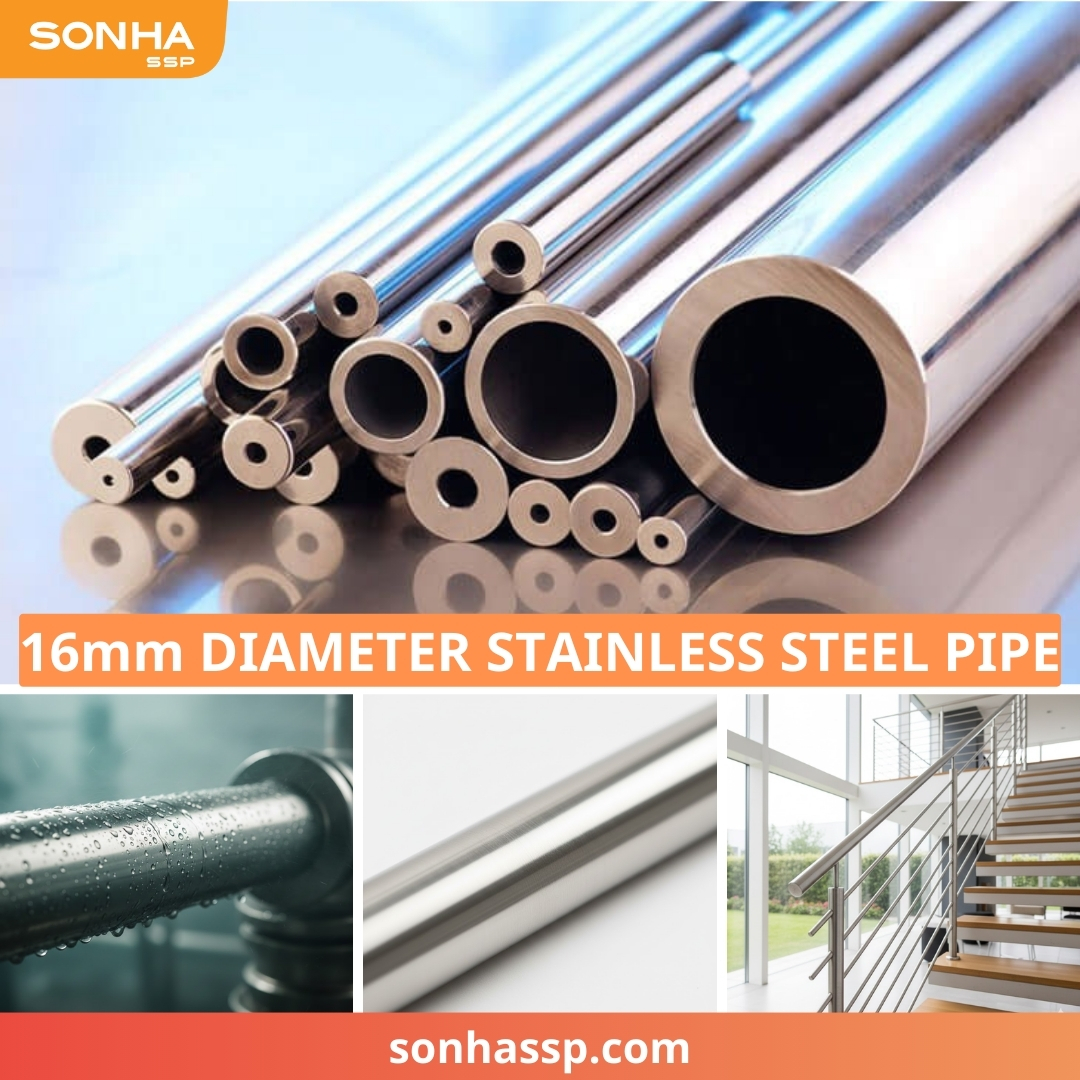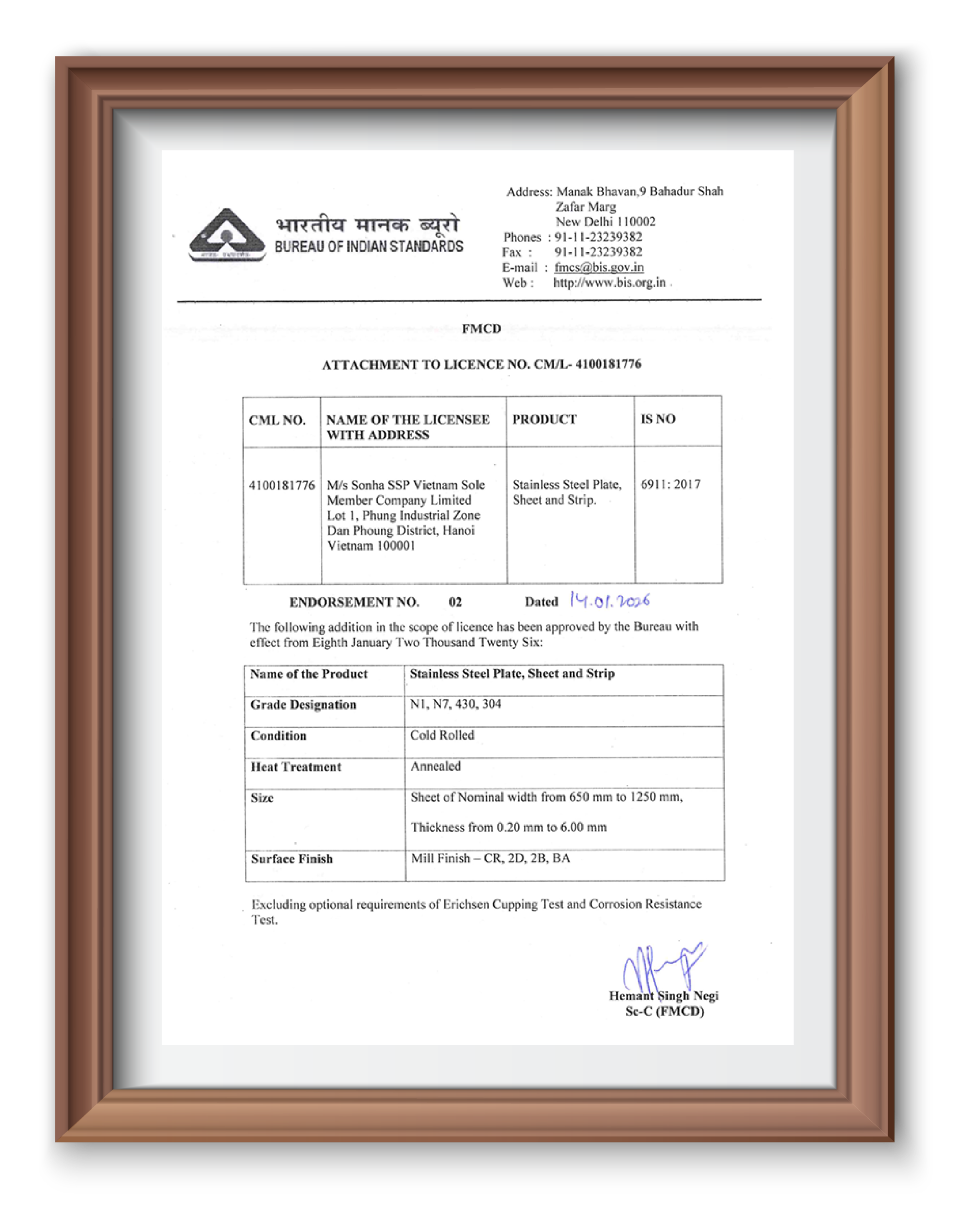Everything about stainless steel water pipes
With superior features such as corrosion resistance, high durability, and ease of maintenance, stainless steel water pipes are becoming the preferred choice in numerous construction projects, from residential to industrial, replacing other material pipe classifications. Let Son Ha SSP guide you through a detailed exploration of stainless steel water pipes to make the best choice for your plumbing system.
1. Definition of Stainless Steel Water Pipes
Stainless steel water pipes are pipes manufactured from stainless steel, possessing exceptional corrosion resistance due to the alloy composition of the steel. A prominent characteristic of these pipes is their excellent strength and heat resistance, withstanding high temperatures and pressures, thus maintaining the quality of the conveyed water without contamination from impurities or toxic metals.

Understanding Stainless Steel Water Pipes
Due to their non-rusting and corrosion-resistant properties, stainless steel water pipes ensure clean and safe water for human health and are widely used in domestic water supply, wastewater, and irrigation systems. They are also utilized in the food, medical, and chemical industries, where durability for both the infrastructure and the health of end-users is paramount. Common stainless steel grades used for pipe production include: 304 stainless steel (SUS304), 201 stainless steel (SUS201), 316 stainless steel (SUS316), etc.
2. Advantages of Stainless Steel Water Pipes
All stainless steel water pipes are made from stainless steel, differing only in the percentage of chemical composition. Therefore, stainless steel water pipes share the following common characteristics:

- Corrosion and Rust Resistance: This is the most significant advantage of stainless steel water pipes compared to conventional steel pipes. Stainless steel contains alloys such as chromium and nickel, which form a protective surface oxide layer, protecting the pipe against corrosion and oxidation upon contact with water or chemicals. Stainless steel water pipes are unaffected by environmental factors and do not rust, even in humid conditions or prolonged water exposure.
- High-Temperature Resistance: Stainless steel water pipes, especially those made from 304 and 316 stainless steel, exhibit excellent heat resistance, withstanding temperatures up to 800°C without deformation or damage.
- High Durability: Stainless steel water pipes offer high durability, excellent load-bearing capacity, and minimal susceptibility to environmental factors like temperature or humidity. This allows for long-term use, reducing maintenance and replacement costs.
- Ease of Cutting, Bending, and Machining: Stainless steel is ductile and easily cut, bent, and machined into various shapes, accommodating diverse project designs.
- High Aesthetics: The polished surface of stainless steel water pipes provides a modern and elegant appearance to structures. Additionally, stainless steel is easy to clean, resists dirt accumulation and yellowing over time, and is unaffected by common cleaning agents.
- Health Safety: Stainless steel does not contain harmful substances such as lead, cadmium, or carcinogens like those found in PVC plastics. Therefore, stainless steel water pipes do not release toxic substances, even at high temperatures.The smooth surface prevents cracks or rough areas where bacteria and algae can adhere, inhibiting the growth of bacteria, mold, and pathogenic microorganisms, ensuring clean and safe water. Stainless steel does not chemically react with water like some other pipe materials, ensuring that the water source remains unchanged.
3. Applications of Stainless Steel Water Pipes
The above-mentioned characteristics make stainless steel water pipes a common material in water supply and drainage systems, from residential to industrial projects. Below are some specific applications of stainless steel pipes in commonly seen water supply and drainage systems:

3.1. Water Supply and Drainage Systems in Residential Buildings and Construction Projects
Stainless steel pipes have become a leading choice in civil projects such as houses, villas, and high-rise buildings. Thanks to their rust and corrosion resistance, stainless steel pipes maintain the long-term durability of water supply and drainage systems while minimizing the risk of blockages due to algae or bacterial growth.
Projects requiring high clean water standards, such as luxury apartments or office buildings, also use stainless steel pipes to ensure stable and safe water system operation. Moreover, the polished surface of stainless steel enhances the aesthetics of the building.
3.2. Domestic Water and Hot Water Systems
Stainless steel pipes are also widely used in domestic water and hot water systems. Thanks to their high-temperature resistance and non-rusting properties, stainless steel water pipes ensure safety for users. In residential areas, hotels, hospitals, or high-end resorts, stainless steel pipe systems provide stable clean and hot water, especially in high-temperature environments. This is crucial for maintaining domestic water quality while saving energy when using hot water systems.
3.3. Industrial Water Systems
Stainless steel pipes are widely applied in water systems in factories and industrial plants, especially in industries requiring large volumes of water and harsh working environments. Industries such as food, pharmaceuticals, chemicals, and electronics manufacturing require water supply and drainage systems that meet high standards of cleanliness and durability.
Stainless steel pipes in these systems not only withstand high pressures but also offer corrosion and heat resistance, ensuring efficiency throughout the factory’s operation. Especially for hot water and industrial wastewater systems, stainless steel protects the system from corrosion caused by chemicals or corrosive waste.
4. Comparison of Stainless Steel Water Pipes with Other Pipe Types
When choosing materials for water supply and drainage systems, contractors and project owners often compare different pipe types, such as plastic, steel, cast iron, and stainless steel. Each pipe type has its own advantages and disadvantages, suitable for different project requirements. Below is a detailed comparison between stainless steel and other common pipe types:

Stainless Steel Water Pipes Offer Advantages Over Other Water Pipe Types
4.1. Stainless Steel Pipes
- Material: Made from stainless steel, primarily alloyed from iron with chromium, nickel, and some other metals.
- Durability: Highly durable, corrosion-resistant, and heat-resistant. Suitable for high-humidity environments or contact with chemicals, salts, or other corrosive elements.
- Applications: Commonly used in the food, medical, construction industries, and water supply and drainage systems requiring high safety standards.
- Advantages: Rust-resistant, heat-resistant, easy to clean, durable.
- Disadvantages: Higher cost compared to other pipe types, difficult to process and weld.
4.2. Steel Pipes
- Material: Made from carbon steel or alloy steel, which can be galvanized to increase rust resistance.
- Durability: High mechanical strength, good load-bearing capacity, but prone to corrosion if not protected (galvanized or painted).
- Applications: Used in oil, gas, and water transmission systems, in construction, and for heavy cargo transport.
- Advantages: Inexpensive, easy to process, high mechanical strength.
- Disadvantages: Prone to rust if not protected, heavier than other pipe types.
4.3. Cast Iron Pipes
- Material: Made from cast iron (usually gray cast iron or ductile cast iron), a high-strength metal but brittle under strong impact.
- Durability: Good pressure resistance and long lifespan. However, easily broken under strong impact.
- Applications: Primarily used in water supply and drainage systems, wastewater systems, water supply systems for large projects, and in heating systems.
- Advantages: High-pressure resistance, long lifespan.
- Disadvantages: Heavy, brittle, not easy to process, prone to corrosion (requires protective coating or anti-rust paint).
4.4. Plastic Pipes
- Material: Made from plastic (usually PVC, PE, PP, or other synthetic plastics).
- Durability: Plastic has lower durability than metal but is lightweight and easy to process. Some plastics offer good corrosion resistance.
- Applications: Widely used in domestic water supply and drainage systems, electrical systems, and other applications requiring lightweight and easy-to-install materials.
- Advantages: Inexpensive, lightweight, easy to transport and install, corrosion-resistant.
- Disadvantages: Poor heat resistance, easily damaged by mechanical impact (especially under strong impact), shorter lifespan compared to metal.
Summary of Key Differences
|
Pipe type |
Durability | Corrosion resistance | Heat resistance | Application |
Price |
|
Stainless steel pipes |
Very high | Very good | High | Food industry, healthcare, construction | High |
|
Steel pipes |
High | Medium (easy to rust if not protected) | High | Construction, oil and gas pipeline |
Medium |
|
Cast iron pipes |
High (pressure resistant) | Medium (needs protection) | Medium | Water supply and drainage, heating system |
Medium |
| Plastic pipe | Medium | Good | Low | Civil water supply and drainage, electricity |
Low |
In summary, stainless steel pipes outperform plastic, steel, and cast iron pipes in many aspects, especially in corrosion resistance, long-term durability, and safety in harsh environments. Although the initial cost of stainless steel pipes may be higher, their long lifespan and low maintenance requirements make them an ideal choice for projects demanding high durability and safety.
5. Precautions for Using and Maintaining Stainless Steel Water Pipes
- Choose the Right Stainless Steel Grade: If the project is near the sea or in a high-humidity area, use 316 stainless steel pipes for better corrosion resistance.
- Regular Inspection: Regularly inspect stainless steel pipes to detect early signs of damage and address them promptly.
- During use, water pipes should be kept clean and disinfected regularly to ensure the quality of water supplied to systems such as reservoirs, factories, or construction sites.
Stainless steel water pipes are an ideal choice for water supply projects due to their superior features such as corrosion resistance, high durability, and good heat resistance. However, choosing the appropriate stainless steel grade, proper installation, and careful maintenance will maximize the effectiveness and extend the lifespan of the water supply system. This article has hopefully provided you with useful information about stainless steel water pipes.
Next latest post

Safe Stainless Steel Pipe Transportation Process and Important Considerations

What Is a Ø16 Stainless Steel Pipe? Specifications, Classification, and the Latest Price List

Son Ha SSP Is Honored to Receive the BIS Certification (India)







